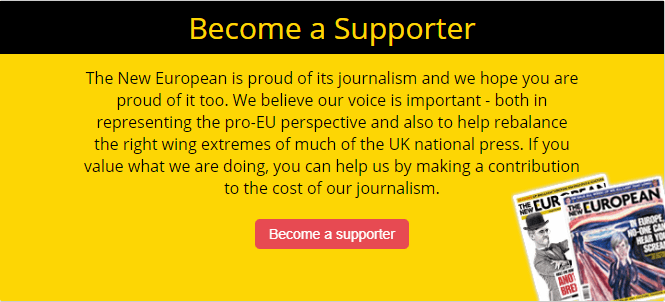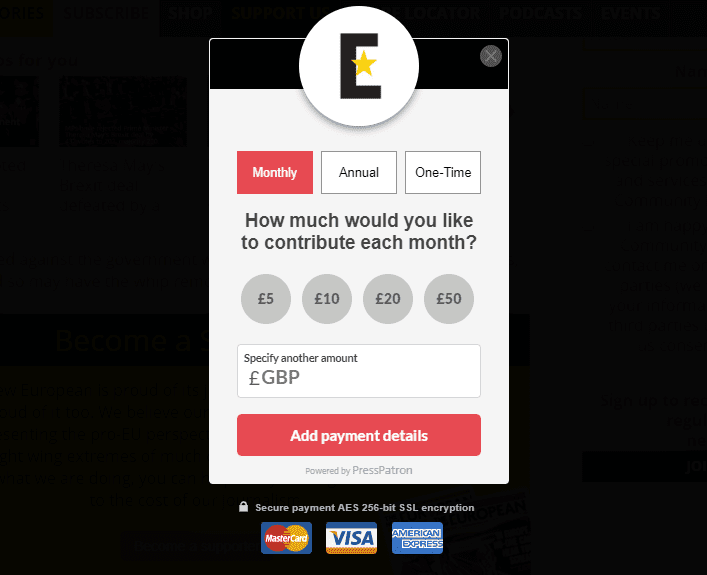|
Getting your Trinity Audio player ready...
|
The New European, a pro-EU publication from Archant, is dropping its micropayments scheme this week in favour of a more ‘Guardian style’ approach to reader revenue.
According to Press Gazette, the micro-paywall, which charged readers 10p for premium articles, “wasn’t the ideal approach” for New European readers.
Archant, who own the paper, have said that it’s not an issue with micropayments or the way the micro-paywall, operated by tech firm Axate, was run. The publisher is in talks about using the service on some of its other titles, with editor Matt Kelly complimenting the way the payment technology worked.
“We have been impressed by the technology, and I think it’s got a good place to play in the payments system,” Kelly told Press Gazette.
“We just found it wasn’t the ideal approach for New European readers who are so passionate about the cause that they want to support us in a more direct way, Guardian style.”
Axate works on a ‘digital wallet’ method, where users pre-pay into a wallet which sites on the corner of the site. When they read a paid item, the cost is deducted from that balance. That means that once the balance is loaded, the micropayment transaction is seamless – although users can choose whether to authorise payments, or have them deducted automatically.
Publishers like The Cricketer and Popbitch are still using micropayments. Popbitch said last year that thousands of readers had signed up after they launched the micro-paywall and ditched banner ads on the site.
The rise of the yellow box
On the New European’s website, readers now see a bright box at the bottom of articles, saying that ‘If you value what we are doing, you can help us by making a contribution to the cost of our journalism”.

The PressPatron-powered donations request closely mimics the user journey of the Guardian’s own contributions box, offering monthly, annual or one-time donation options.
For a site like the New European, which relies on a passionate and committed audience, micropayments are perhaps not the best way for readers – who will be frequent visitors – to show support.
The title, which was originally launched as a four-week pop-up experiment after the 2016 Brexit referendum, has seen unparalleled success both in print and online, with the weekly edition having a consistent circulation of 21,000-25,000. It has navigated numerous almost-Brexits, and is now set to remain in print as a ‘quality political periodical’ should the UK ever actually leave, according to the Drum.
Online, the New European has built up a following of 2 million monthly visitors. Given the dedicated audience they have, there is significant opportunity here to develop their contributions scheme into a full membership offering: lose membership of the EU, gain membership of the New European…
Positive News is a similar example of a publisher with a dedicated online community and a clear mission. They also have a ‘Support’ section where people can contribute financially to Positive News online without necessarily buying the magazine.
That’s not to say micropayments are doomed; a point Axate’s Dominic Young was keen to emphasise to Press Gazette after Popbitch’s success with the technology. “Subscriptions are great for people very committed to a product, but there’s a massive gap of people who have a habit of reading a publication but don’t feel committed enough to pay for content every day.”
Instead, micropayments are better suited to more generalist publishers; those who are looking to capture revenue from a drive-by audience. Readers may not visit the site often enough to feel any particular loyalty, and not to pay for a full subscription if they hit a paywall.
We’ve argued plenty of times about whether micropayments has a future or not, but it’s not a straightforward debate. Micropayments certainly have a part to play in the publishing ecosystem, and it’ll take time in this rush to reader revenue to find out how many paywalls and donation requests readers can stomach before they really find their place.




